The tail-end of a storm torrent washes over the driveway’s blue-brick menorah. Across the road, Praise Jesuses hail from a Pentecostal church; its neon palm-tree sign blinks in the drizzle. A tall, white-robed man greets us at the gate; his matching yarmulke contrasts against the dome of his black-skinned head.
Heather and I are at the Bethel Messianic Assembly – a dilapidated house-turned-synagogue in Yeoville that’s filled with Nigerian Jews. The sermon is in full swing, and we’re shown to two chairs inside a corrugated side-building. Before we can sit down, a woman gestures wildly to us, while another hurriedly hands us sarongs. “You can’t wear trousers in the shul!” scorns the second woman. All eyes are on Heather and I, while we try to wrap the sarongs around our jeans. The rabbi stops mid-sermon and waits for us. Once securely saronged, we take our respective seats (men and women don’t sit separately), and the rabbi tells the congregation that there are two guests today. He unexpectedly punctuates the damp air with a “Say Hallelujah!” I get a fright and drop my pen under someone’s chair; everyone Hallelujahs!
I fix my eyes on a sign on the wall opposite me, which has the day’s schedule printed on it. We seem to have arrived in the middle of ‘Prophet’s Sum Up’. It’s a couple of weeks after the US election, and the rabbi suddenly shouts out, “We were praying that that woman didn’t win! We prayed for this!” Everyone claps. “Say Hallelujah!”
Everyone Hallelujahs!
What? Wait, are they Hallelujah-ing Donald Trump? Before my brain can figure out what’s happening, the rabbi switches gears and shoots off a barrage of questions: “How do you separate the Jews from Jesus? Do you want to be judged, or perish? Is God Nigerian? Say Hallelujah!”
Everyone Hallelujahs!
I drop my pen again.
***
Heather and I are sitting on a couch in Rabbi Nathan Obiekwe’s make-shift lounge, the upholstery is faded and ripped in places. My peripheral vision catches a mouse scuttling across the passage. I ask the rabbi to tell me more about his religion, Messianic Judaism.
“We have picked certain things from Christianity and married it with Judaism,” begins Rabbi Nathan. “We believe that the messiah is Jesus Christ. The Jews and Christians shouldn’t be divided, but the Christians have been selective when it comes to the New and Old Testament, like keeping the idea of tithes but dropping Shabbat.
“Jesus was a Jew, he never condemned a single Jewish law,” adds the rabbi, quite emphatically. “We call Jesus ‘Yahshua’, and we believe that he will come back.”
“So you’re basically like the Jews for Jesus?” I ask.
“I suppose you can say we are similar to them,” replies the good rabbi.
Rabbi Nathan (that’s his Hebrew name, but he was never taught how to read Hebrew) belongs to the Igbo tribe, from Nigeria. “Biologically, all Igbos are Jewish; they came from Israel 3 000 years ago, and are descendants of Gad [the biblical son of Jacob]. The Igbos have no written history and they had their own form of writing, but when the British came, they subdued it.
“Some people think that Jews only come from Europe, that they’re only white-skinned. But Jesus was black, so was Solomon. Look, I’ll prove it to you.”
He grins and picks up a battered Holy Bible, thumbs through to a specific verse from The Song of Solomon, and asks one of us to read from it. I don’t say anything, so Heather volunteers. She clears her throat and reads the words, ‘I am dark but lovely, oh daughters of Jerusalem.’
“You see, it’s because of migration and adaptation,” says the rabbi. “You can’t live in Nigeria and be white-skinned, there’s no winter, and it’s so hot. You can’t be black and Russian, or black and Polish. Indian Jews look Indian. Ethiopian Jews look Ethiopian. Nigerian Jews look Nigerian. All Igbos are biologically Jewish but some have become Christian over time,” adds the rabbi.
“But not Muslim”, he points out. “That’s an abomination.”
Heather gives him back the bible.
Rabbi Nathan isn’t a fan of Catholics (or as he calls them, ‘The Romans’), either.
“The Romans killed more Jews than Hitler, and they hijacked Jesus. I’m an African, but frankly speaking, I have a problem with The Romans, the way they interfere with religion. It’s broken our relationship with God completely; no one relates to God directly.”
Mainstream Judaism views Messianic Jews with scepticism, as orthodox Jewish beliefs dictate that you’re only Jewish if your biological mother is a Jew. But the Igbos believe that the maternal bloodline doesn’t take precedence.
“’Modern’ Judaism believes that you’re Jewish through your mother, but we believe that David is Jewish because of his father, not his mother. I believe that you’re Jewish through your father; as long as you have some Jewish in you, you’re Jewish.”
We conclude that Heather must be ‘full Jewish’, as her mother is Jewish and there is Jewish blood on her father’s side, too. I don’t have a drop of Jew in me, only The Roman. I keep this to myself.
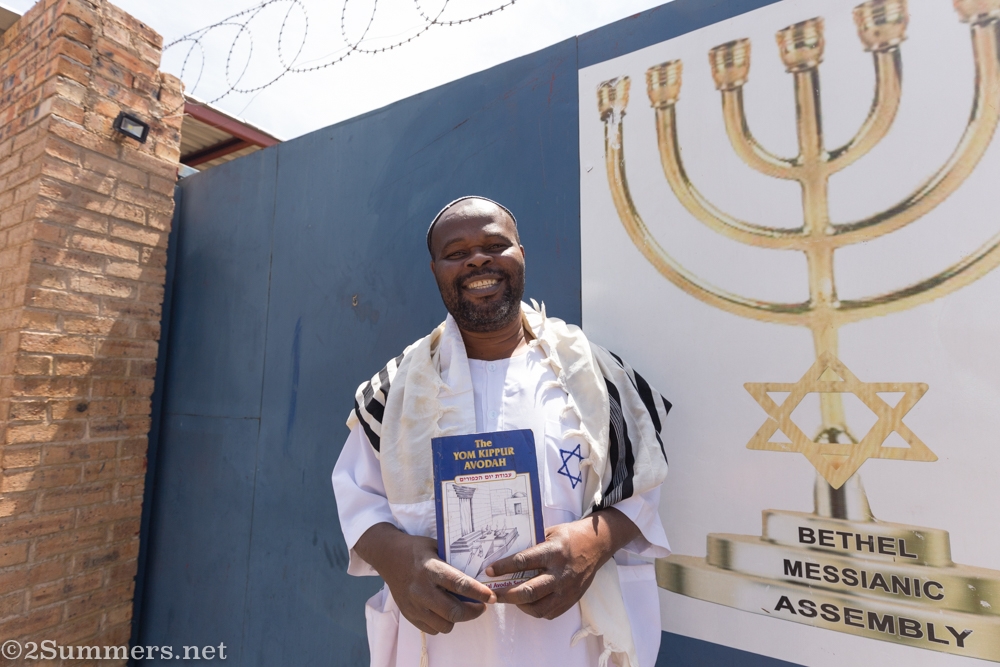
***
“I experienced an earthquake in South Africa!” shouts the rabbi to his congregation. He paces up and down, arms waving. “It shifted my bed! Why do these things not happen in Israel? In Rome, an earthquake would swallow their antiquities. Where is their God? Say Hallelujah!”
Everyone Hallelujahs!
***
A photo of the rabbi and his wife is stuck to the lounge wall, its ends curled with age. I ask Rabbi Nathan to tell us more about how he ended up in Joburg.
“Before I came to South Africa I was living in Lagos – I already had a synagogue in eastern Nigeria, which was having problems due to a land dispute. One night I dreamt that I was in a place called Cape Town, and, in my dream, I was told to go there. When I woke up, I didn’t know much about geography and I had no idea where Cape Town was. I dream a lot, and I often get so much information in my sleep. I told my friends about the dream, and they brought me a map of the world, and I saw that Cape Town was at the bottom of Africa. I realised that my synagogue in Nigeria was having problems because God wanted me to go to South Africa.
“No one believed me that I had a dream to come here, and it was hard coming here; I had no sponsor and struggled on my own. The Jews here didn’t recognise me – because I’m from Nigeria, they viewed me with suspicion, like I was part of a scam. And I don’t blame them.
“I never got to Cape Town. I arrived in Joburg and didn’t know anyone. I just had the number of a man who was related to someone from my Nigerian synagogue. The taxi dropped me at a Formula 1 Hotel; I remember opening the window – it was a Sunday morning and the whole city seemed deserted. Nigeria is a populous country, there are people everywhere. Where are these people, in Joburg, I wondered? The country was so empty to me.”
From there, the rabbi moved to Rosettenville, and then finally to Yeoville. “I attended synagogue at Temple Israel, and I walked from Yeoville to there every Shabbat. They tried to push me out at first, and I understood that, but little by little they accepted me. When they found out I’m Igbo they opened up. Some of the Igbo members from the Hillbrow shul would join me to pray in my one-bedroom flat’s sitting room – I’d bring other Igbos from the [nearby] shuls, or if they didn’t go to shul they’d pray at home because they didn’t feel welcome. After two years the space become too small, so I looked for a bigger place. I wanted to move but I was told in a dream to stay here. It’s still not enough space, but what can I do? Every Shabbat I try my best to get everyone here, I prepare a Shabbat meal. They come from all over, some even come from Pretoria.”
***
There’s animalistic, demon-be-out screaming from the Pentecostal church across the road. “They’re looking for money,” says the rabbi, matter-of-factly. “Holy Ghost Fire, it’s nonsense. I talk to them, but they see us as non-believers and we’re going to hell. It’s very loud, but what are you going to do?”
***
The rabbi seems to talk about dreams a lot, so I ask him if he’s a prophet.
“Yes, I’m a seer. It’s hard to introduce myself as a seer, and in this environment, you don’t publicise it. I was gifted with it since I was a child. But I don’t advertise the fact as most people will think it’s a scam. People use the name of God to do a lot of terrible things, especially in Nigeria. Like TB Joshua.
[mks_pullquote align=”left” width=”300″ size=”24″ bg_color=”#f9f9f9″ txt_color=”#000000″]“People use the name of God to do a lot of terrible things”[/mks_pullquote]
“My parents want me to get a real job, become a businessman,” he adds. “But what can they say? It’s my calling. I don’t have much money but I’ve never done crime. If you go to Nigeria and say you’re from South Africa you’re automatically considered a criminal, or you have HIV. And when Nigerians come here everyone thinks we’re criminals. It’s both sides of the coin, a lack of understanding.”
***
Songs of Solomon
Look! It is Solomon’s carriage, escorted by sixty warriors, the noblest of Israel […]
His head is purest gold; his hair is wavy and black as a raven […]
His cheeks are like beds of spice yielding perfume. His lips are like lilies dripping with myrrh […]
Dark am I, yet lovely, daughters of Jerusalem, dark like the tents of Kedar, like the tent curtains of Solomon […]
***
The praising and worshipping in the synagogue is accompanied by singing, dancing, Miles Davis trumpet playing. It’s Gospel, its soulful, its unadulterated joy. I find myself wanting to bust a move, but I’m scared my sarong falls off. “We praise God like black people!” shouts the rabbi, his yarmulke falling off his head. Everyone Amens! There’s a woman standing outside, deemed unclean because she’s on her period. Umbrella in hand and infant strapped to her, she smiles while dancing beneath the rain clouds, her baby bobbing on her back.
We don’t stay for the full five-hour shul service, but we say our Shabbat Shaloms in the rain and are told we’re welcome back anytime.
***
Later that evening, Heather gets a WhatsApp from Rabbi Nathan: ‘May Elohim bless and keep you, oh daughter of Jacob.’
All images 2Summers. To see more of her images from the Bethel Messianic Assembly in Yeoville, Johannesburg, see 2Summers’ blog post
To read more about #TheGodProject, go here

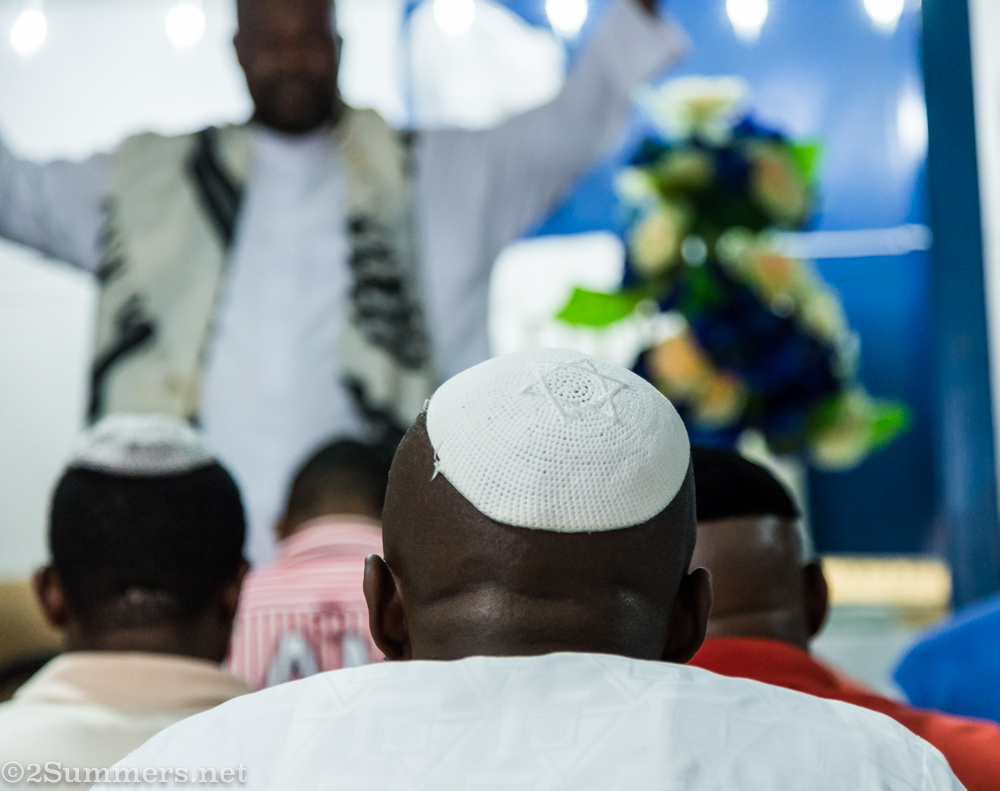
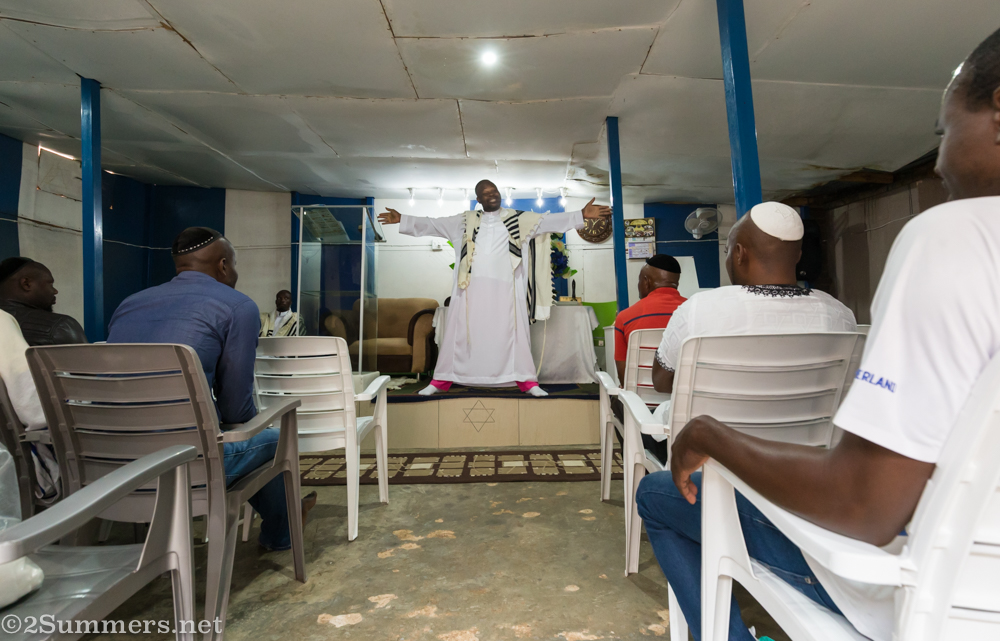
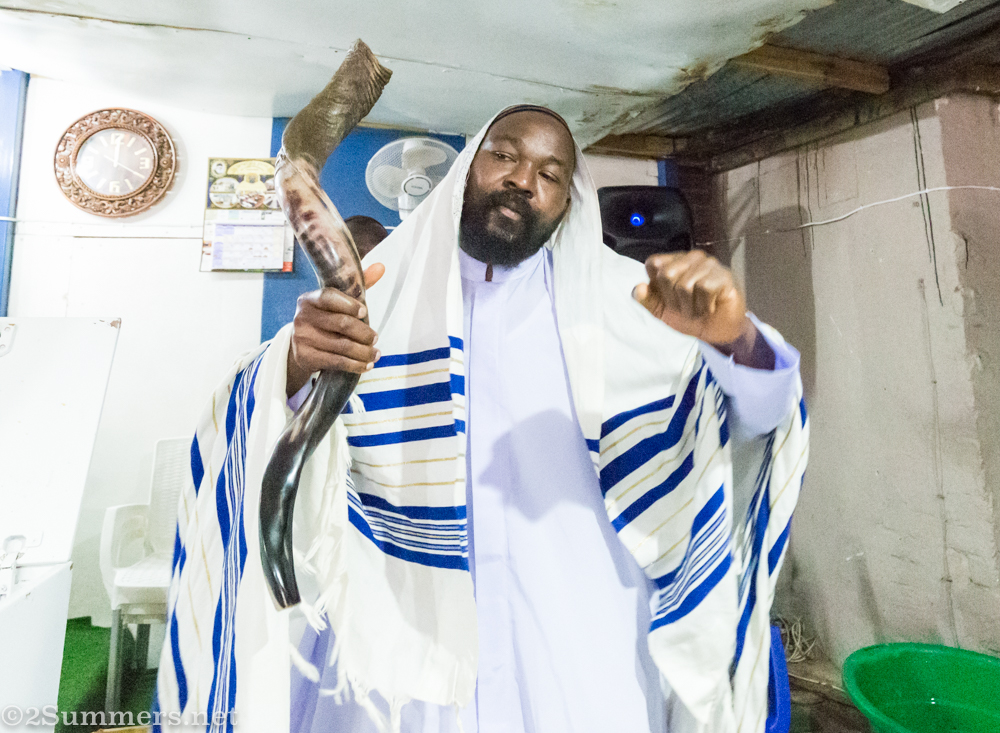
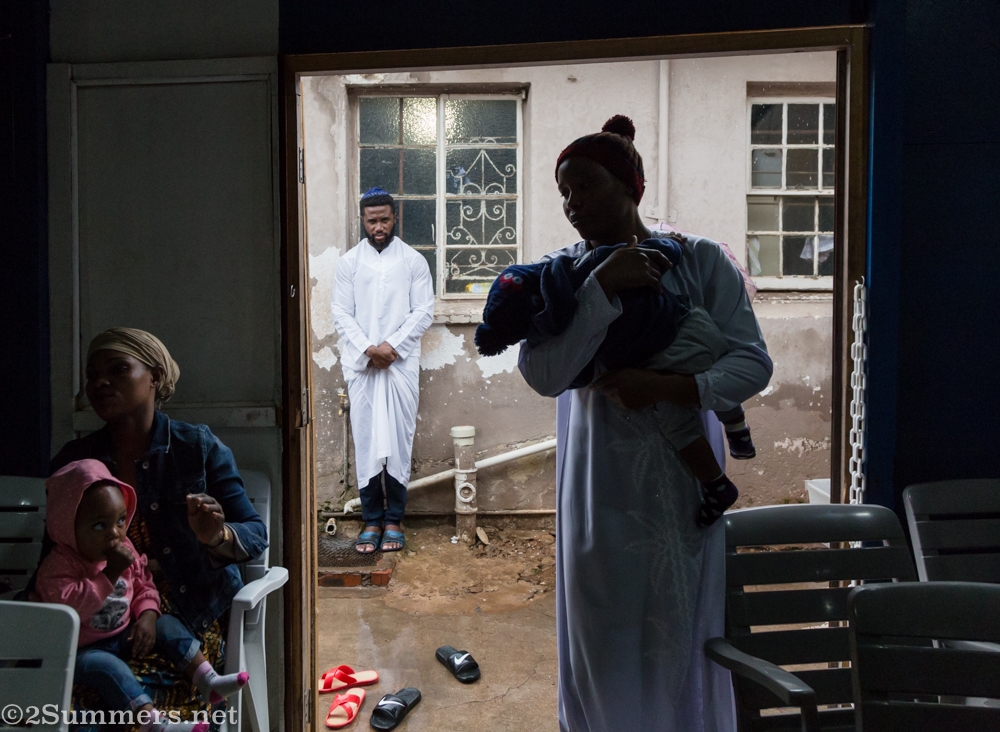
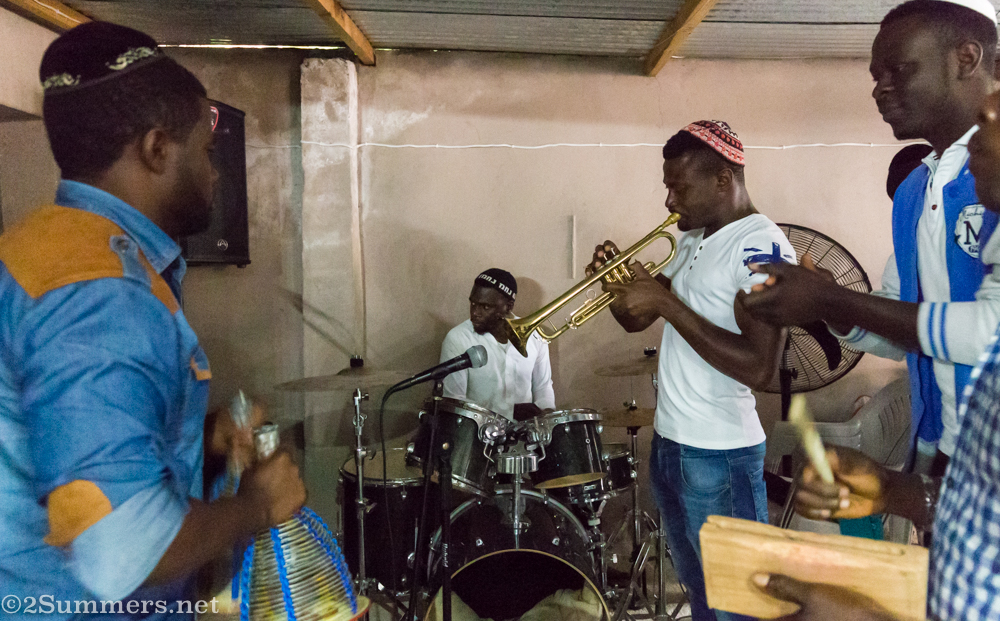
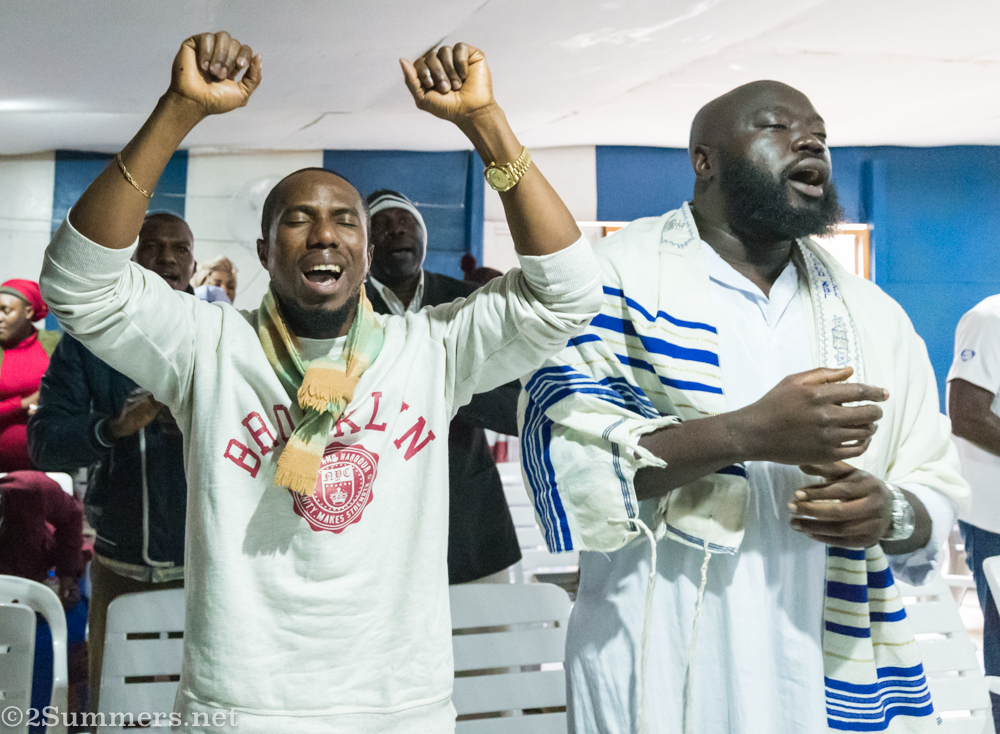
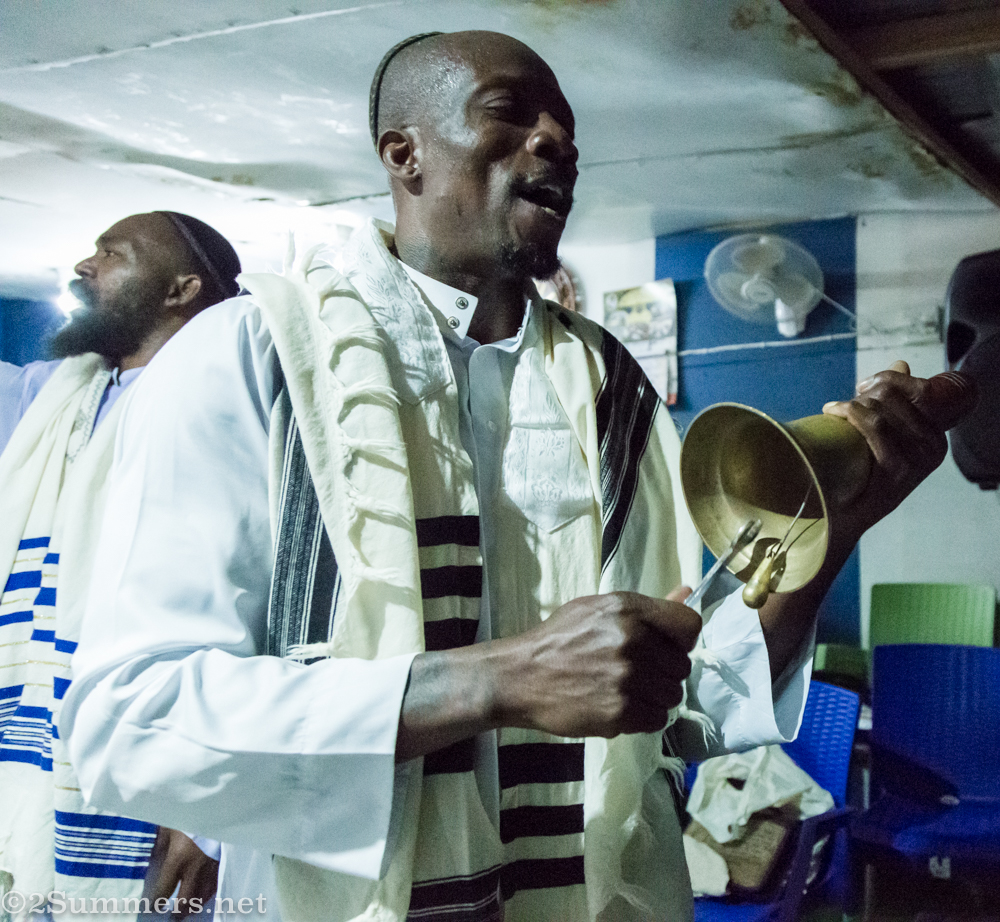

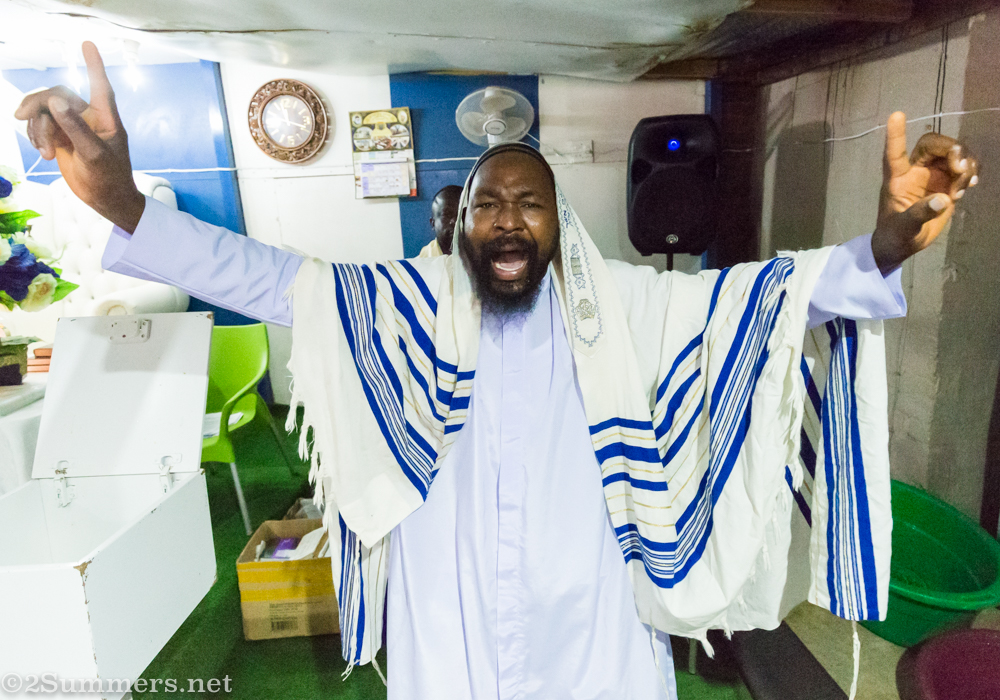
Finlyal! This is just what I was looking for.
“So you’re basically like the Jews for Jesus?” I ask….. , Or a mix of Judaism and Seventh Day Adventist? Interesting read.